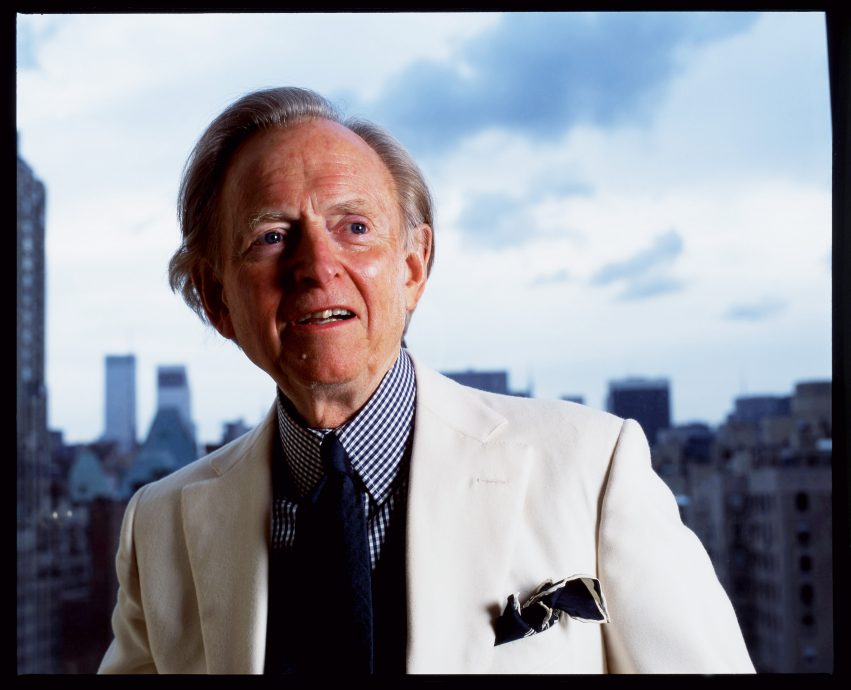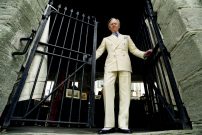In Darwin’s scheme, there can be no noble or ignoble, no virtuous or vicious, and ultimately no high and low.
From Cavemen to Tom Wolfe
It’s not difficult to come up with a theory of language. Mine is vaguely Augustinian (if we ignore the scholars’ endless battles over what St. Augustine meant by signs and reference), and it looks like this: All language starts in pain. The first speech of humankind is the newborn’s howl of outrage.
Of course, the infant survives because its scream is answered with mother’s milk. How could such an interaction not form a powerful mental, emotional, and physical association—coming, as it does, at the first and most primal moment of existence? Noise is a call, and it brings a response. Desire thus gets transformed into speaking.
Yes, the baby’s wordless howl for food differs somewhat from “May I have the damask roses, please, in—yes, I rather think—the loutrophoros vase by the east window? They will look quite enchanting there, I imagine.” But the difference lies only in sophistication, not kind.
What’s not to love about this theory of language? It has going for it everything a theory could want: intuitive plausibility, dramatic narrative, and reductive simplicity. What it lacks, unfortunately, is proof—proof, and any way it could be proved. The theory is, like the most satisfying of conjectures, entirely nonfalsifiable and yet pregnant with implications. Desire, the human hunger, lies at the root of language, the theory insists; and out of our bodies’ need is born the speech we use.
Tom Wolfe—now 85 years old, the great grand-dandy of American prose—has a theory of language, too, and he’s laid it out, to some extent, in his latest work, a small essay-length book called The Kingdom of Speech. Speech originates in the need to remember, Wolfe suggests, and language is a mnemonic device.
As it happens, Plato once ironically bemoaned the invention of writing, claiming that script was a diminishment of language. Our ability to write weakens memory, you see, as mechanical marks on a slate replace the harder use of the mind’s recollection of words. Now, in The Kingdom of Speech, Wolfe reaches even further back to say that speech itself begins with memorizing.
Think of those archaic Celtic counting systems, the vestigial remnants of vigesimal numbers still remembered by English shepherds and nursery rhymes: Yan, Tan, Tethera, for example, or Hickory, Dickory, Dock. Language survives, handed on from generation to generation, because it’s useful—perhaps the most useful thing humans have ever created. Wandering the prehistoric world, our hunter-gatherer progenitors increasingly found a need to organize and keep track of things: the berry bushes that didn’t poison them, the wooden weapon that shouldn’t be used as firewood, the rock on which no one but the leader should sit.
Distinct noises helped them remember which was which, and pretty soon (on a geological timescale) the human skill at mnemonics had moved us from grunts and grumbles to such words as, “On Wall Street he and a few others—how many? three hundred, four hundred, five hundred? had become precisely that . . . Masters of the Universe.” Or “There goes (Varoom! Varoom!) that Kandy-Kolored (Thphhhhhh!) Tangerine-Flake Streamline Baby (Rahghhh!) around the bend (Brummmmmmmmmmmmmmm) . . . ”
As a theory, meh. It’s nicely reductive, but not a particularly dramatic account of the birth of language or especially rich with implications for how we get from prehistoric noises to, say, Tom Wolfe’s wordy genius. I expected more from the man, simply because he’s perhaps the most influential writer of the past 50 years—reintroducing voice into American prose and perfecting the New Journalism of the 1960s that still dominates our national attempts at essay-writing.
Still, Wolfe likes his theory of language, I think mostly because it sidesteps any need to refer to evolution. Discussing language, thinkers from Plato to Augustine—even thinkers as late as Ludwig Wittgenstein and Sigmund Freud—could begin with children’s acquisition of speech and (Ontogeny recapitulates phylogeny, man!) work up a theory of how the race uses language. But somewhere around 1950, evolution became the established dogma of scientists: not just a powerful hypothesis in biology but a religion and meta-theory of science. And ever since, everyone who wants to claim the title of scientist has been compelled to spill a little blood on the carpet, recite the proper cantrips, and conjure up the ghost of Charles Darwin.
Linguistics professors all do so desperately want to be scientists, trading the elbow-worn tweed jackets of the bookish old philologists for the freshly pressed lab coats of their envied colleagues in the chemistry department. And so they have to explain language in evolutionary terms. We received language . . . well, no. Language arose, that’s the better formulation, because a mutation of the larynx allowed a superior survival technique. We’re not quite sure why that was, or what path of survival takes us from there to “Tell me, O Muse, of the man of many devices, who wandered full many ways after he had sacked the sacred citadel of Troy.” But, you know, evolution. The word alone is a doxology in the great church of scientism.
Tom Wolfe thinks it’s all pseudo-intellectual goo. He accepts evolution in biology, has no theological commitments except his longstanding atheism, and is a pretty definite modern. But he thinks evolution has been stupidly applied beyond its proper realms—the easiest proof of which is found in language: an entirely human artifact, he believes, that is the single greatest engine of progress and the most significant difference between people and animals.
Darwin supposed, on a first try at explaining language, that we began to speak in imitation of bird calls. As far as Wolfe is concerned, evolution hasn’t much improved in its verbalizing. In The Kingdom of Speech, Darwin comes across as a good old-fashioned Victorian scoundrel: a pious old fraud to be mocked as comprehensively as Wolfe once mocked Leonard Bernstein and the other purveyors of radical chic.
This vicious account of Darwin deserves to be a fifth chapter in Eminent Victorians, Lytton Strachey’s 1900 devastation of his grandparents’ generation. Wolfe’s Darwin (1809-1882) is a rich and pampered child of the arrogant and privileged class of wealthy intellectuals. He never did any real work, spent decades noodling around on the edges of biology, and only published Origin of Species in 1859 because he heard that Alfred Russel Wallace was drawing out a parallel thesis. Wallace was, alas, from the lower classes—Quite praiseworthy, of course, to have risen from such humble beginnings but . . . well, not one of our kind, you know—and Darwin and his well-connected cohorts brushed him off like dust from their coats.
Language theory was ignored by biologists and anthropologists for the next hundred years, mostly because evolution had no way to explain the rise of words. Still doesn’t, according to Wolfe. But in the late 1950s there came along a man who said that he’d solved the evolutionary problem of language, and the intellectual world sank to its gabardine knees in awe.
His name of course is Noam Chomsky, and he quickly becomes the second intellectual target at which Wolfe aims in The Kingdom of Speech. The “father of modern linguistics,” according to his worshippers, Chomsky (at 88, he’s three years older than Wolfe) dominated the field of linguistics for decades after claiming that evolution explained language acquisition. A mutation of the brain had, Chomsky argued, created the neural pathways that defined a “universal grammar” as a kind of logical frame within which all of the different languages of our species could emerge.
Wolfe zeroes in on a key ingredient of that grammar: the concept of recursion, in which sentences can contain and refer to sub-sentences, like a nest of Russian dolls. “I knew that Suzie knew that I had gone fishing,” for example. Wolfe believes, however, that the 2005 work of a linguist named Daniel Everett completely undid the Chomsky theory. Everett—like Wallace, an outsider—had spent time documenting the Pirahã tribe along the Amazon, and he found that the Pirahã spoke a language without recursion.
So. Chomsky wrong. No uniform language-acquisition device built into human biology. No mandatory structure of universal grammar. All of which means, no biological description of language. No evolutionary account.
We can finally drop the whole stupid attempt, in the pseudo-religion of scientism, to insist that evolution explains everything. It doesn’t explain the Pirahã. It doesn’t explain the birth of speaking. It doesn’t explain why languages grow less complex over time, not more. And it sure as hell doesn’t explain what Tom Wolfe feels when he uses language to write the zinging sentences that are his trademark.
As it happens, Wolfe is wrong about a lot of this narrative. Everett was hardly the first or the most important of those who began knocking Chomsky’s linguistics off its pedestal over the past two decades. The idea of universal grammar has been more or less rejected by the linguistics professors for years. For that matter, if the non-speaking proto-human organism evolved into a human organism that speaks, then the capacity to speak is clearly a result of the mutation-device that drives evolution. We can argue about whether or not speech provided an evolutionary advantage at the moment of its first appearance, but we can’t really argue that speech derived from the same changes that produced the genome of us, the current crop of human primates.
In other words, The Kingdom of Speech is not the book that’s going to demolish the idea of evolutionary biology. Which is good, since evolutionary biology is an observably useful scientific theory. The Kingdom of Speech is also not the book that’s going to destroy the idea of evolution as a meta-scientific view of everything. Which is bad, since we really need to abolish the Church of Darwin. Its all-encompassing scientism has brought us bad theology, bad philosophy, and bad science. Bad thinking, all the way down.
Maybe bad poetics, most of all. Tom Wolfe isn’t wrong that evolution has yet to provide an account of language that can possibly satisfy those who write with verve and gusto. The writers for whom words are alive—warm-blooded and active creatures—need more than biology has given them. Unfortunately, they also need more than Tom Wolfe has given them, this time around.



